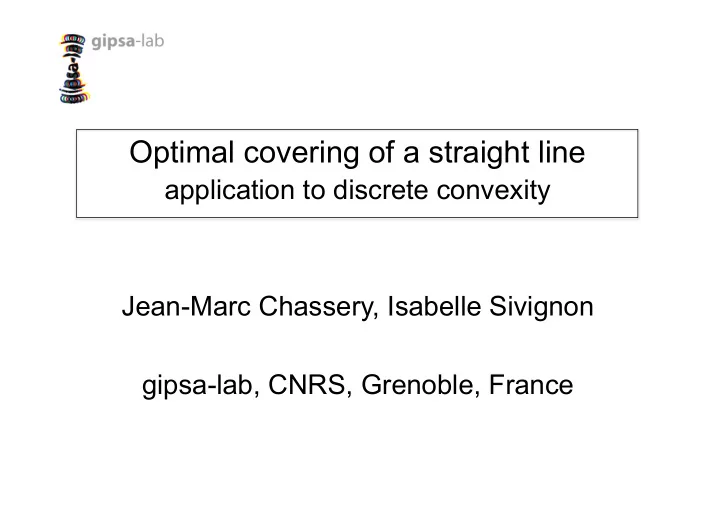

Optimal covering of a straight line application to discrete convexity Jean-Marc Chassery, Isabelle Sivignon gipsa-lab, CNRS, Grenoble, France
Continuous convexity P Q Optimal covering of a straight line applied to discrete convexity — JM Chassery, I Sivignon -- DGCI 2013 2
From Continuous space to discrete space P Q Optimal covering of a straight line applied to discrete convexity — JM Chassery, I Sivignon -- DGCI 2013 3
From discrete space to continuous space Tessel P Q Optimal covering of a straight line applied to discrete convexity — JM Chassery, I Sivignon -- DGCI 2013 4
Convexity on dilated covering balls ε ? ; ½ ≤ ε < 1 P Q Optimal covering of a straight line applied to discrete convexity — JM Chassery, I Sivignon -- DGCI 2013 5
Discretization of a straight line using OBQ quantization process ax − by c + µ = 0 ax − by d + µ = r y d - y c = r/b { (x,y) € R 2 ; 3x − 8y + µ = 0} 2 ; 0 ≤ 3x − 8y + µ < 8} { (x,y) € Z Optimal covering of a straight line applied to discrete convexity — JM Chassery, I Sivignon -- DGCI 2013 6
Upper and lower leaning points The vertical distance between a pixel of remainder r of the DSL and the line L is equal to r/b, with r varying from 0 to b − 1. ax − by + µ = 0 ax − by+µ=b − 1 The value r = b − 1 is obtained for a lower leaning point Optimal covering of a straight line applied to discrete convexity — JM Chassery, I Sivignon -- DGCI 2013 7
Covering by balls with radius = (b-1)/b Not covered Not covered Optimal covering of a straight line applied to discrete convexity — JM Chassery, I Sivignon -- DGCI 2013 8
Local configuration: D = U [ proj (P i ), proj (P i+1 )] P i and P i+1 are 4-connected Optimal covering of a straight line applied to discrete convexity — JM Chassery, I Sivignon -- DGCI 2013 9
Local configuration: D = U [ proj (P i ), proj (P i+1 )] P i and P i+1 are 8-connected Optimal covering of a straight line applied to discrete convexity — JM Chassery, I Sivignon -- DGCI 2013 10
Using Thales Theorem We prove: ρ (r)=a(b-r)/b(a+b) and ε (r)= ρ (r) + r/b = (a+r) / (a+b) Optimal covering of a straight line applied to discrete convexity — JM Chassery, I Sivignon -- DGCI 2013 11
Theorem Let L be a straight line of equation ax − by+µ = 0 , Let L its digitization with the OBQ scheme . The union of balls B(P i , ε ) centered on pixels P i of the DSL L with radius ε = max(1/2, (|a|+|b| − 1)/(|a|+|b|) ) covers the straight line L . This set doesn’t contain any other digital pixels excepted those of the DSL. Optimal covering of a straight line applied to discrete convexity — JM Chassery, I Sivignon -- DGCI 2013 12
Optimal covering of the straight line 3x − 8y + µ = 0 ε = 10/11 { (x,y) € R 2 ; 3x − 8y + µ = 0} 2 ; 0 ≤ 3x − 8y + µ < 8} { (x,y) € Z Optimal covering of a straight line applied to discrete convexity — JM Chassery, I Sivignon -- DGCI 2013 13
Application to discrete convexity Initial connected component Optimal covering of a straight line applied to discrete convexity — JM Chassery, I Sivignon -- DGCI 2013 14
Delimitation by minimal and maximal columns Optimal covering of a straight line applied to discrete convexity — JM Chassery, I Sivignon -- DGCI 2013 15
Discrete convex hull component ε = 1/2 ε = 2/3 ε = 1/2 ε = 1/2 ε = 2/3 ε = 1/2 ε = 1/2 The discrete convex hull is ε -convex with ε = 2/3 Optimal covering of a straight line applied to discrete convexity — JM Chassery, I Sivignon -- DGCI 2013 16
Conclusion • Discrete convexity is defined in perfect compatibility with continuous convexity. • When sampling value tends to zero, discrete convexity definition is similar to continuous convexity definition. Optimal covering of a straight line applied to discrete convexity — JM Chassery, I Sivignon -- DGCI 2013 17
Recommend
More recommend